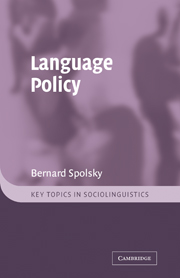Book contents
- Frontmatter
- Contents
- List of tables
- Preface
- 1 Language practices, ideology and beliefs, and management and planning
- 2 Driving out the bad
- 3 Pursuing the good and dealing with the new
- 4 The nature of language policy and its domains
- 5 Two monolingual polities – Iceland and France
- 6 How English spread
- 7 Does the US have a language policy or just civil rights?
- 8 Language rights
- 9 Monolingual polities under pressure
- 10 Monolingual polities with recognized linguistic minorities
- 11 Partitioning language space – two, three, many
- 12 Resisting language shift
- 13 Conclusions
- References
- Index
4 - The nature of language policy and its domains
Published online by Cambridge University Press: 22 December 2009
- Frontmatter
- Contents
- List of tables
- Preface
- 1 Language practices, ideology and beliefs, and management and planning
- 2 Driving out the bad
- 3 Pursuing the good and dealing with the new
- 4 The nature of language policy and its domains
- 5 Two monolingual polities – Iceland and France
- 6 How English spread
- 7 Does the US have a language policy or just civil rights?
- 8 Language rights
- 9 Monolingual polities under pressure
- 10 Monolingual polities with recognized linguistic minorities
- 11 Partitioning language space – two, three, many
- 12 Resisting language shift
- 13 Conclusions
- References
- Index
Summary
TOWARDS A THEORY OF LANGUAGE POLICY
The analysis of language policy as it affects linguistic items like sounds and words provides a good basis for understanding the field. Such policies, based on various beliefs about language, develop within various social groups, and commonly result in efforts to manage the language practices of others. Pronunciations, spellings, words or kinds of language are discouraged or forbidden or punished or required, as obscene or sacrilegious or violent or impure or foreign or appropriate or modern. Much the same kind of forces will be found to underlie policies directed to named varieties of language.
There are four main features to the theory of language policy being developed in this book. The first is the tripartite division of language policy into language practices, language beliefs and ideology, and the explicit policies and plans resulting from language-management or planning activities that attempt to modify the practices and ideologies of a community.
Policy may be implicit, in which case there can be honest disagreement as to what is the real policy of a community. For example, there are those who argue that United States language policy is essentially monolingual, finding evidence in the low level of recognition of use of any language other than English, while others interpret the widespread use of other languages and the legal and official support of multilingual services as proof that it is really multilingual (see ch. 7). An explicit written policy may not be implemented.
Information
- Type
- Chapter
- Information
- Language Policy , pp. 39 - 56Publisher: Cambridge University PressPrint publication year: 2003
Accessibility standard: Unknown
- 1
- Cited by
